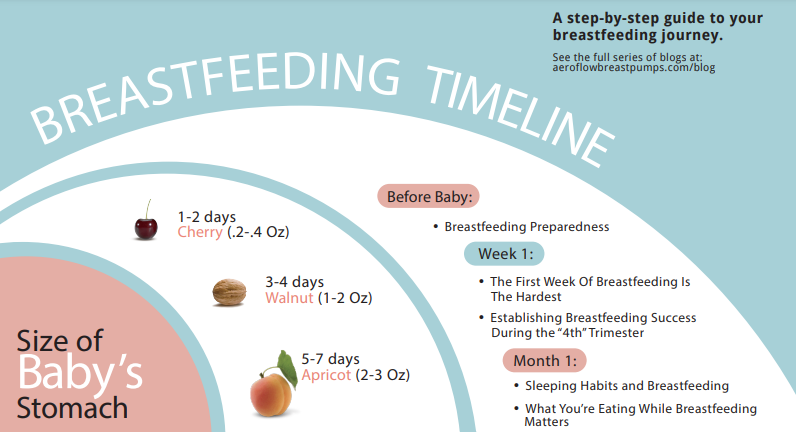While the first days after giving birth are incredibly special, you may still be experiencing some pain from labor. This is totally normal! Your hormones are also going crazy, which can make this a very emotional process.
Being able to bond with your new baby and soak up all those special moments certainly makes it all worth it (how can you not stare at those itty bitty toes and fingers!), and soon you’ll be embarking on a new experience together. Your breastfeeding journey has just begun! While you may be a bit nervous, this is such a special time for you and your little one.
While you probably have a desired breastfeeding plan in place (good for you, mama!), you may still have some questions about the beginnings of breastfeeding. As they say, everyone starts somewhere! Don’t be embarrassed if you need some extra support during this time.
Here are our ABCs of breastfeeding to help you get through the first week with your breastfed baby:
Conquering Your First Week Breastfeeding
Day 1
Within an hour after birth, your little one makes it known that they are hungry, and this never changes! You’ll always know and that’s a good thing. For some mother-baby duos, early feeding comes easily and seamlessly, but for 67% of new moms, it’s just the start of a journey that can feel overwhelming and, we’ll be honest, challenging. You are doing something you’ve never done, so take heart.
Try to get as much skin-to-skin contact as possible with your newborn as quickly as you can after giving birth. Skin-to-skin contact has many great benefits, including helping to promote breastfeeding. Skin-to-skin is very effective for helping establish a solid breastfeeding connection. You’ll want to try to get your newborn baby on the breast within 30 minutes of giving birth to help jump-start a successful breastfeeding journey.
Wondering what that thick, yellow, creamy stuff is coming out of your nipples? That’s the good stuff, known as colostrum. Colostrum is full of protein and nutrients, and it's the ideal meal for your little one. Some women will notice colostrum leaking out of their breasts in their last trimester, while others won’t have it appear until after the baby comes. Both are fine and nothing to be concerned about—your body knows what it’s doing!
It’s also good to be sure you’re getting as much rest as possible postpartum, and drinking plenty of fluids.
2-4 Days After Birth
By day two, your baby will probably want to be on the breast at least eight times in 24 hours. It may be more likely that you’re feeding every hour to two. It’s normal to start feeling tired (though exhaustion might be a better word…). After hours of no sleep, constant visits from nurses and doctors, and trying to figure out how to get your new baby to latch on to your breast correctly, your mind and body are going to be drained. However, this too shall pass! Keep it up, and you and your baby will start to find your breastfeeding rhythm soon enough.
Continue nursing consistently at the one-to-two-hour mark if you can. By day three, your breast milk has probably arrived. If you haven’t already, see if your insurance will cover a free breast pump. When your breast milk comes in, you may feel uncomfortable engorgement at first. Feeding your baby on demand and offering your breast to the baby frequently can help your body begin to regulate your milk supply and adjust it to the level your baby needs so they have enough breast milk. If you’re engorged, pumping for a short period (no more than a couple minutes) can also help take the edge off and soften the nipple, but we recommend cold compresses and icing. You can also try investing in a good nursing bra and a lot of nursing pads (or even a nursing pillow for both mom’s and baby’s comfort)!
Many lactation specialists agree that day three can be the hardest for moms. Breastfeeding is a whole new experience, and it takes a little getting used to. Perfecting your baby’s latch doesn’t usually happen right away, and it is important to remember that it may take some patience to establish. If you’re experiencing sore breasts, breast tenderness, or pain while nursing, remember that it is common, but it may signal that you might need some helpful advice.
The biggest tip a new mom can take when trying to make it through the first few days is to be easy on yourself. This is one of the hardest jobs a woman has in her life, but the nutritional and health benefits of breastfeeding are well worth it. Don’t be afraid to ask for help from your hospital’s lactation department or your healthcare provider, and if you need a break, be sure to let your partner or a family member hold the baby while you take a moment to yourself. Remember: Rome wasn’t built in a day. This is supposed to take time!
Days 5 and 6 (And Beyond!)


By day five, your milk supply should be increasing. Though there is unfortunately nothing you can do to make this happen faster, encouraging frequent feedings can help establish a more consistent supply. But this is also the point when your baby’s feeding cues and patterns begin to change. They may spend less time at the breast or alter their suckling pattern. Don’t stress! This is normal. Just continue to offer both breasts to your baby so baby has enough milk and you can begin to see hunger cues.
The first week of breastfeeding contains many of the biggest pitfalls for moms, but if you approach it confidently and with supportive helpers, you can make great strides toward breastfeeding success.
Breastfeeding and Mental Health
So what can you do to support your mental health when it comes to feeding your baby? Here are six important breastfeeding tips:
Learn Your Feeding Options
You can learn about feeding options during pregnancy and adjust postpartum; having a well-thought out feeding goal and support system often makes for a positive breastfeeding experience. Research suggests that the risk of developing perinatal mood and anxiety disorders increases when expectations don’t meet reality. This is especially true when it comes to our expectations for how we feed our babies. That’s why we encourage all moms to have a healthy support system in place and to manage their expectations. Love on yourself just as much as you’re loving on that new baby!
Do Research and Find Lactation Support
If you’re currently pregnant, try to do some research during pregnancy about lactation or breastfeeding support, like taking a breastfeeding class and collecting resources from your hospital. While we all hope that our feeding journey goes smoothly, bumps happen—especially in the first few days and early weeks post delivery, as milk supply is getting established and the baby is learning to eat. The only thing worse than having a hungry baby is not having a way to feed them quickly. Knowing where you can get support can help! Even meeting with a lactation consultant before birth or taking courses online, can be helpful as you begin to think about a pumping or feeding schedule that works best for you and baby.
Nurse or Pump for an Oxytocin Boost
Pumping still gives you all those feel-good hormones! Research shows that oxytocin—the hormone that elevates your mood—is still released from the brain during pumping let-down. So if nursing isn’t in your feeding playbook, you can still reap this benefit during a pumping session.
Practice Your Breath work
Try to slow down and breathe deeply. When you’re in fight or flight mode from anxiety and stress, all non-essential body functions, such as producing milk, are dampened. Research suggests that calming the sympathetic nervous system can amplify your milk production, and the easiest way to do that is through breath work. There are ton of methods out there, but the guiding principle is to have your exhalations be longer than your inhalations. To start, do a four-count breath in and an eight-count breath out during your pumping or feeding session to support your milk flow.
Know You're Supported
Remember that no matter what ups and downs breastfeeding brings (and trust us, there will be both!), you are not alone. However your journey unfolds, you’re doing amazing, mama! No matter how you choose to feed your child—whether by breastfeeding, pumping, or formula—it does not define you as a mother or a human. While it seems like a momentous decision, it’s one of many thousands of decisions you’re going to make as a parent in the coming years.
Visualize Success
Consider visualizing your success. The power of visualization can help you overcome difficult moments and obstacles that stand in your way. Being intentionally mindful can help you to manifest your goals. If you’d like more support in visualizing success through proven practices, check out mindfulness exercises in the Canopie app.
Canopie is a digital app that offers evidence-based, personalized programs for expecting and new moms to soothe anxious minds, reduce stress, and boost mood. Download the Canopie app or visit their website.











